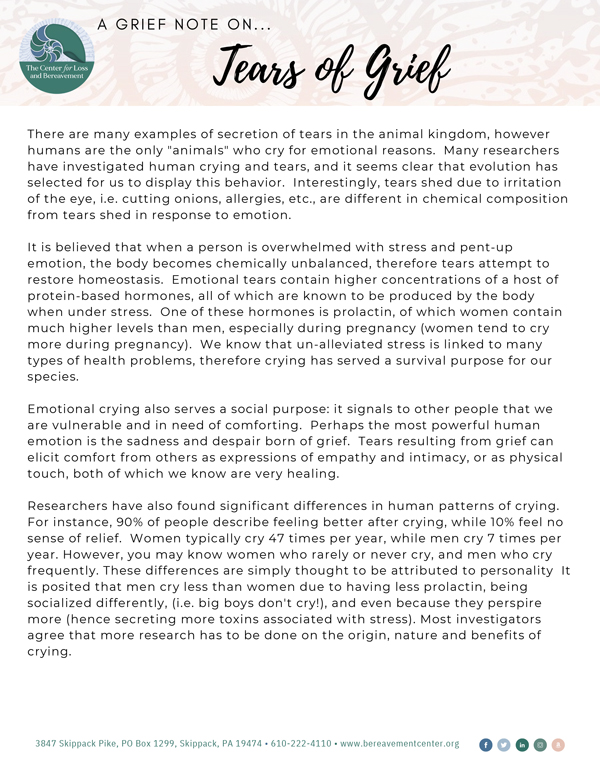CLB Grief Notes
A Grief Note On…
Tears of Grief
There are many examples of secretion of tears in the animal kingdom, however humans are the only “animals” who cry for emotional reasons. Many researchers have investigated human crying and tears, and it seems clear that evolution has selected for us to display this behavior. Interestingly, tears shed due to irritation of the eye, i.e. cutting onions, allergies, etc., are different in chemical composition from tears shed in response to emotion.
It is believed that when a person is overwhelmed with stress and pent-up emotion, the body becomes chemically unbalanced, therefore tears attempt to restore homeostasis. Emotional tears contain higher concentrations of a host of protein-based hormones, all of which are known to be produced by the body when under stress. One of these hormones is prolactin, of which women contain much higher levels than men, especially during pregnancy (women tend to cry more during pregnancy). We know that un-alleviated stress is linked to many types of health problems, therefore crying has served a survival purpose for our species.
Emotional crying also serves a social purpose: it signals to other people that we are vulnerable and in need of comforting. Perhaps the most powerful human emotion is the sadness and despair born of grief. Tears resulting from grief can elicit comfort from others as expressions of empathy and intimacy, or as physical touch, both of which we know are very healing.
Researchers have also found significant differences in human patterns of crying. For instance, 90% of people describe feeling better after crying, while 10% feel no sense of relief. Women typically cry 47 times per year, while men cry 7 times per year. However, you may know women who rarely or never cry, and men who cry frequently. These differences are simply thought to be attributed to personality It is posited that men cry less than women due to having less prolactin, being socialized differently, (i.e. big boys don’t cry!), and even because they perspire more (hence secreting more toxins associated with stress). Most investigators agree that more research has to be done on the origin, nature and benefits of crying.
A Few More Tidbits: Crying by the Numbers
20% of bouts of crying last more than 30 minutes
8% go on for longer than one hour
70% of criers make no attempt to hide their crying
77% of crying takes place at home
15% at work or in the car
40% of people weep alone
39% of crying occurs in the evening
Netdoctor, (Dr. Gail Kinman, Dr. William H. Frey II, Dr. Abigail San); The Independent (Dr. Carrie Lane, University of Texas)
Join Our
Mailing List
Donate
Today
Request
Information

Affiliations
• NACG
• CBEM Changemaker
• ADEC
• Charity Navigator
Quick Links
About Us
Individual & Family Grief Counseling
Volunteer
News
Grief Support Resources
Contact
Ph: 610-222-4110
Fax: 610-222-4116
3847 Skippack Pike
P.O. Box 1299
Skippack, PA 19474
Support The Center For
Loss and Bereavement
